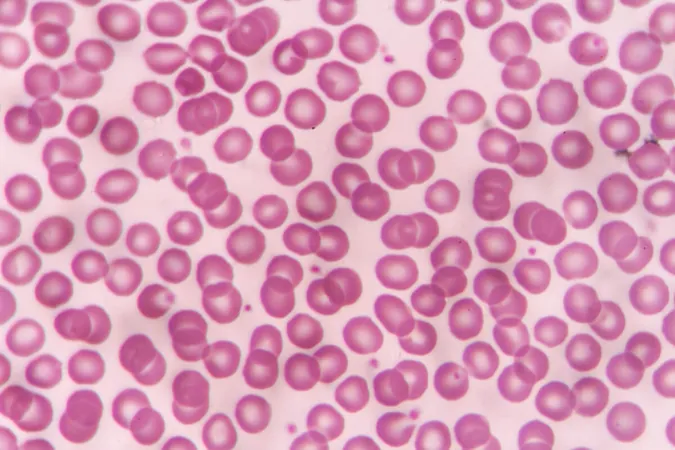
Revolutionizing Cancer Treatment: Scientists Create Advanced Drones from Red Blood Cells
2024-12-26
Author: Li
Introduction
In a groundbreaking development from the National University of Singapore, scientists are transforming the fight against lung cancer with a novel approach that mimics drone technology. This innovation aims to tackle the elusive nature of cancer, particularly lung cancer, which has historically presented a formidable challenge to medical professionals.
Understanding Non-Small Cell Lung Cancer (NSCLC)
Non-small cell lung cancer (NSCLC)—which makes up about 80% of all lung cancer cases—remains a pressing global health concern, ranking as the second most commonly diagnosed cancer worldwide. Current treatments, namely tyrosine kinase inhibitors (TKIs), often provide only a temporary solution, with patients developing resistance to these therapies within 10 to 14 months, resulting in cancer relapse and progression.
The Challenge of Resistance
The key to this resistance lies in certain mutations prevalent among NSCLC patients, particularly affecting the epidermal growth factor receptor (EGFR) gene. When mutated, this gene can cause uncontrolled cell proliferation, similar to having an accelerator pedal that cannot be released. Although TKIs attempt to block the activity of the mutated gene, cancer cells are adept at adapting, sometimes acquiring further mutations that allow them to circumvent these treatments.
Innovative Strategy by the Research Team
Leading the charge against this challenge is Assistant Professor Minh Le and his research team, who have turned their focus to a more comprehensive solution. Instead of blocking the protein produced by the mutated gene, their strategy involves the use of cutting-edge antisense oligonucleotides (ASOs). These specialized molecules are designed to target and deactivate the mutated gene, addressing the source of the issue rather than its effects.
Adaptive Delivery Mechanism
What sets this approach apart is its remarkable adaptability. The scientists can quickly modify the ASOs to tackle emerging mutations, which is crucial in the ever-evolving landscape of cancer treatment. However, delivering these therapeutic agents to the right location in the body has proven difficult, as they are prone to degradation in the bloodstream.
Using Red Blood Cells as Delivery Vehicles
To overcome this hurdle, the researchers ingeniously crafted tiny delivery vehicles from red blood cells, known as extracellular vesicles (EVs). These vesicles serve as precise molecular drones, expertly navigating the body's system to deliver the ASOs directly to cancer cells while avoiding healthy tissues. By doing so, they can utilize the body's own mechanisms for efficient delivery without attracting the immune system's attention.
Promising Results and Future Prospects
The results, published in the esteemed journal eBioMedicine, have been extraordinarily promising. Their laboratory studies revealed that this personalized ASO therapy outperformed traditional treatments, even in cases where tumors had shown resistance to existing therapies. In what could be a game-changer for cancer care, the researchers saw significant tumor regression in patient-derived tumor models—actual cancer tissues taken from patients who had run out of other treatment options.
Expert Opinions and Outlook
As Tam Wai Leong, Deputy Executive Director of A*STAR Genome Institute of Singapore, highlighted, this method harnesses EVs as a powerful delivery system for nucleic acid therapeutics, potentially revolutionizing how malignancies are treated. The hope is that this tailored treatment will not only effectively target mutant EGFR cancer cells but also spare healthy cells, paving the way for bespoke cancer therapies that adapt to individual patient needs.
Conclusion
This innovative leap in cancer treatment underscores the potential of combining cutting-edge molecular biology with advanced drug delivery systems—signaling a bright future for personalized medicine in oncology. With continued research, these precision cancer-fighting drones could soon become a critical weapon in the ongoing battle against cancer, offering new hope to patients around the globe.



 Brasil (PT)
Brasil (PT)
 Canada (EN)
Canada (EN)
 Chile (ES)
Chile (ES)
 España (ES)
España (ES)
 France (FR)
France (FR)
 Hong Kong (EN)
Hong Kong (EN)
 Italia (IT)
Italia (IT)
 日本 (JA)
日本 (JA)
 Magyarország (HU)
Magyarország (HU)
 Norge (NO)
Norge (NO)
 Polska (PL)
Polska (PL)
 Schweiz (DE)
Schweiz (DE)
 Singapore (EN)
Singapore (EN)
 Sverige (SV)
Sverige (SV)
 Suomi (FI)
Suomi (FI)
 Türkiye (TR)
Türkiye (TR)